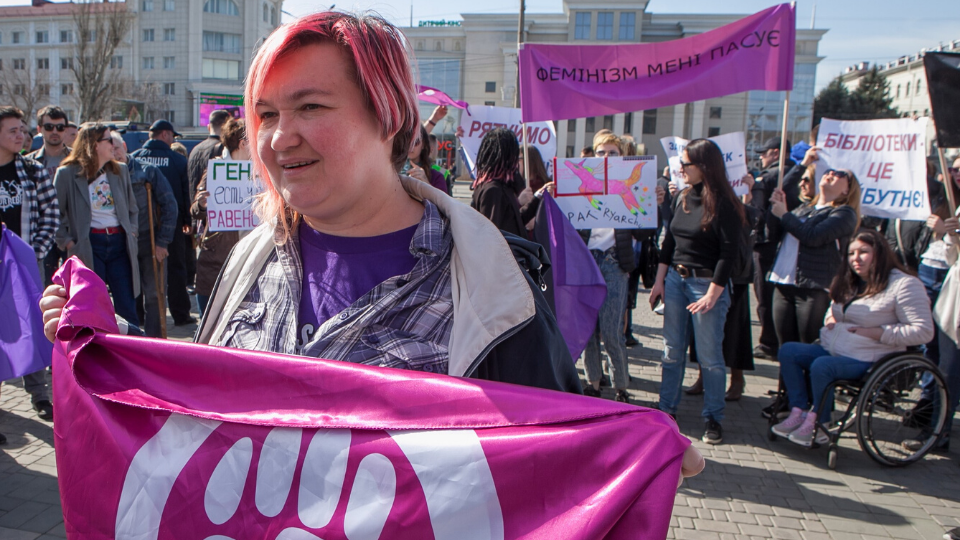Take Five: “The violence against LGBTI activists and women have the same root causes”
Maryna Usmanova is a director of the charitable foundation Insha (Other), a Ukrainian LGBTI and women’s rights organization. Over the past five years, the organization implemented advocacy projects to promote fundamental rights, gender equality, tolerance, and social inclusion. Insha was also part of the coalition ‘Kherson without violence’, which initiated a crisis centre for victims of domestic violence in Kherson city in southern Ukraine. On 8 March, with the support of UN Women, the foundation organized the Feminist march for the fourth year in a row to call for the ratification of the Council of Europe convention on combating violence against women and domestic violence (Istanbul Convention).Date:

How did you decide to become an advocate for LGBTI community rights?
Well, it was quite a natural process for me as I belong to the LGBTI community. For a long time, I have been in a partnership with a woman. And, when I gave birth to a child, I realized that there were a number of things that other people had access to by default, but we did not. For instance, once our child got sick while I was on a work trip. My partner was unable to stay in the hospital with him as she had no documents confirming her as a mother. My friend and I founded the magazine Insha, where we discussed the numerous threats Ukrainian women encountered living in a very patriarchal society. At that time, it was the only feminist and lesbian publication in Ukraine. Later in 2014, we founded our charitable organization.
What was the biggest challenge you tackled during the last five years?
There were and still are many. We position ourselves not only as an LGBTI but also a feminist organization. We believe that the causes of violence, and oppression of LGBTI people and women are similar. These are misogyny and gender segregation when people believe that you must act or behave in a certain way based on predefined gender roles in the society. In this sense we did not fit into a broader movement to protect women’s rights. On the other hand, our ‘feminist agenda’ did not allow us to integrate into the LGBTI community either. Fortunately, much has changed since then, and today we are considered influential members of civil society.
Were there any specific issues inherent in your region?
We are lucky as Kherson is a multicultural city. It would be impossible to exist without a certain degree of tolerance. If we compare it, in particular, with the Western regions where there is quite a high level of homophobic violence, we operate under more favourable conditions. We hold marches on 8 March every year, as well as the pride event in May. Surprisingly, the police were very proactive from the beginning. We observe homophobic violence in families when LGBTI girls and boys are kicked out of their homes. We also face cyberbullying when the photos of our activists are published in social media.
Have you noticed any changes in society’s tolerance and recognition of LGBTI rights?
I definitely see a positive change. Several years ago, human rights activists treated us with caution. But over these years, we have conducted successful joint advocacy campaigns with other NGOs. For instance, we joined the coalition Kherson against violence. We also have an absolutely open office in the city centre that hosts a lot of cultural events, such as theatre shows and film screenings. Even if a person comes with preconceptions, they meet our activists and consequently start to change their attitude. We also organize information sessions on LGBTI rights for the different professional groups (doctors, police officers, lawyers, journalists, etc.). I can say that there is not as much open expression of homophobia as it used to be even a few years ago.
If there was one thing you could change to protect the rights of the LGBTI community, what would it be?
During the last two years a massive anti-gender campaign was launched across Ukraine, including in the Kherson region. Even though people are quite tolerant, the city council and the regional council adopted petitions in defence of so-called ‘family values. The document suggests to ‘forbid the promotion of homosexuality’, to remove the word ‘gender’ from the legislation, and not to ratify the Istanbul Convention. We believe that our primary goal is to counteract this. It is also vitally important to spell out the anti-discrimination legislation so it would explicitly prohibit discrimination based on sexual orientation and gender identity. The same goes for the hate crime legislation. There is still a lot of work in this regard. As Lewis Carroll wrote, “if you wish to go anywhere you must run twice as fast as that.” We are ready to run.